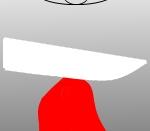In The Handmaid's Tale (New York: Anchor Books: 1998) by Margaret Atwood, the Gilead holds Offred, whose real name is never revealed, a prisoner because she is a woman. Atwood adds to the realism of Offred's situation by using Biblical allusions. Almost everything within the novel has a Biblical reference or Biblical origins. The name of the country, the role of women and their reason for imprisonment, down to the ceremonies and the soldiers in the army all are founded in the Bible. These Biblical roots are used as justification for the Gilead regime practices.
A theocracy is a government of a state run by immediate divine guidance or by officials who are regarded as divinely guided. The Gilead Regime is one such government. The name is derived from the Biblical "mount of Gilead" which comprised of 3 of the 12 tribes of the Sons of Jacob (Genesis, 31:21). The United States Government was completely destroyed during what is known as the President's Day Massacre, where the president and his entire cabinet were gunned down, allowing a cult group of fundamentalist Christians to take over the government and suspend the US Constitution.
Women were stripped of rights: they were not allowed to own property, read or write. Women were now considered property.
Due to the decline in Caucasian births, the Gilead instituted what are known as Handmaids. The handmaid idea is taken from the Bible:
And when Rachel saw that she bare Jacob no children,
Rachel envied her sister; and said unto Jacob, Give me
children, or else I die.
And Jacob's anger was kindled against Rachel; and he
said, Am I in God's stead, who hath withheld from thee
the fruit of the womb?
And she said, Behold my maid Bilhah, go in unto her,
and she shall bear...


